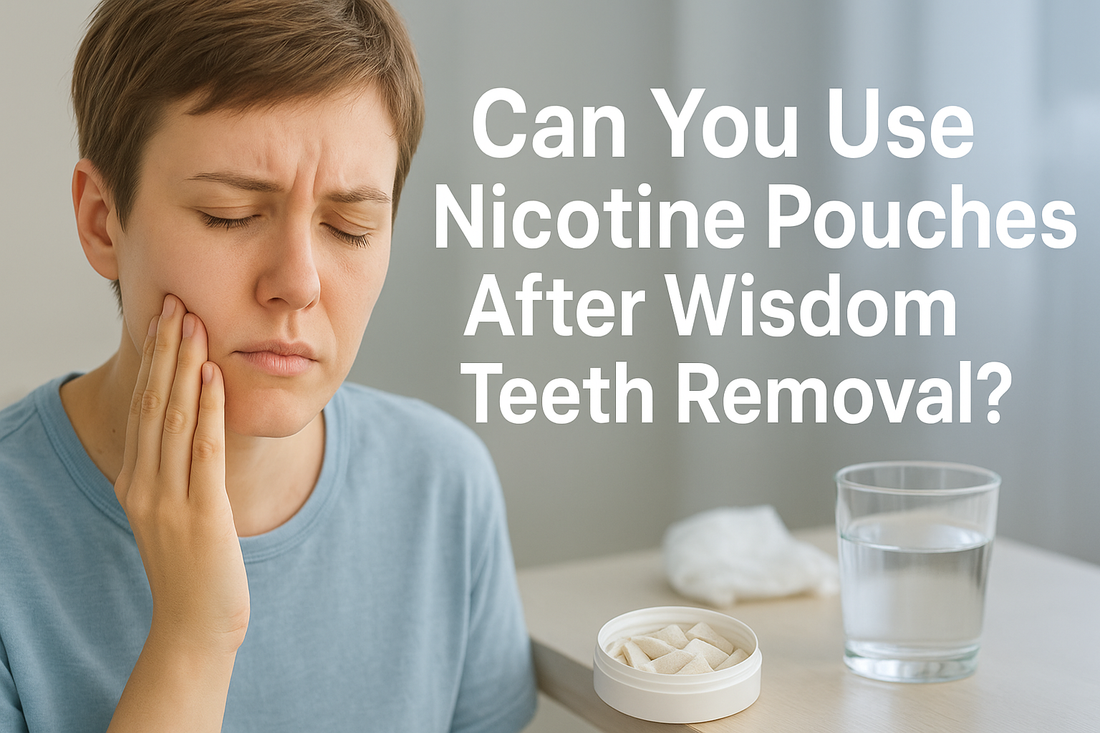
Can You Use Nicotine Pouches After Wisdom Teeth Removal?
Wisdom teeth removal is one of the most common oral surgical procedures, requiring careful post-operative care to ensure optimal healing and prevent complications. For individuals who regularly use nicotine pouches, questions naturally arise about when and how to safely resume use following extraction. This comprehensive guide provides evidence-based guidance on navigating nicotine pouch use during wisdom teeth recovery.
Understanding Wisdom Teeth Removal Recovery
Wisdom teeth extraction involves creating surgical sites in the mouth that require specific healing conditions to recover properly. The extraction sites develop blood clots that serve as protective barriers and foundations for new tissue growth. These clots are essential for preventing dry socket, infection, and other complications that can significantly prolong recovery.
The healing process typically follows predictable stages: immediate clot formation within the first 24 hours, initial tissue healing over 3-7 days, and complete healing extending several weeks depending on extraction complexity. Each stage has specific requirements and vulnerabilities that influence decisions about resuming normal activities, including nicotine pouch use.
Understanding this healing timeline helps inform decisions about when nicotine pouch after wisdom teeth removal might be safely considered, always in consultation with your oral surgeon or dentist who can assess individual healing progress and provide personalized guidance.
The Critical First 48-72 Hours
Can I use nicotine pouches after wisdom teeth removal during the immediate post-operative period? Dental professionals universally recommend avoiding nicotine pouches during the first 48-72 hours following extraction. This critical period is when blood clots form and stabilize, creating the foundation for successful healing.
During this initial period, any activity that creates suction, pressure changes, or mechanical disturbance in the mouth can potentially dislodge protective blood clots. While nicotine pouches don't create the strong suction associated with smoking or drinking through straws, their placement and removal still involve oral manipulation that could affect healing sites.
The nicotine itself may also influence healing during this crucial period. Research suggests that nicotine can affect blood flow and cellular processes involved in wound healing, making it particularly important to avoid during the most critical healing phase.
Blood Clot Protection and Dry Socket Prevention
Dry socket (alveolar osteitis) represents the most common complication following wisdom teeth removal, occurring when protective blood clots become dislodged or fail to form properly. This painful condition exposes underlying bone and nerves, significantly extending recovery time and requiring additional treatment.
Prevention strategies focus on protecting blood clots through avoiding suction, spitting, aggressive rinsing, and mechanical irritation of extraction sites. While nicotine pouches create less mechanical disturbance than smoking or vaping, their placement near extraction sites could potentially interfere with clot stability.
The discrete nature of pouches might make them seem safer than other nicotine products, but the critical importance of clot protection during early healing makes conservative approaches advisable. Professional guidance helps determine when individual healing progress supports safe resumption.
Professional Consultation and Individual Assessment
Every wisdom teeth extraction is unique, with factors including extraction complexity, patient age, overall health, and individual healing characteristics affecting recovery timelines and recommendations. Professional assessment remains essential for safe decision-making about resuming nicotine pouches after wisdom teeth removal.
Oral surgeons and dentists can evaluate healing progress during follow-up appointments, assessing clot stability, tissue development, and overall recovery status. This professional evaluation provides the foundation for personalized guidance about when nicotine pouch use might be safely resumed.
Individual factors including extraction difficulty, number of teeth removed, patient age, and overall health status all influence healing timelines and appropriate precautions. These variables make professional consultation more valuable than general timelines or recommendations.
Gradual Resumption Strategies
When professional assessment indicates that healing has progressed sufficiently to consider resuming nicotine pouch use, gradual approaches typically provide the safest pathway. This might involve starting with shorter usage periods, careful placement away from extraction sites, and close monitoring for any signs of complications.
Placement Considerations Initial resumption benefits from strategic placement away from extraction sites, choosing locations in the mouth that minimize contact with healing tissues. This approach reduces mechanical irritation while allowing gradual return to normal use patterns.
Duration and Frequency Modifications Starting with shorter usage periods and reduced frequency helps assess individual tolerance and healing compatibility before returning to normal patterns. This gradual approach enables early detection of any complications.
Monitoring and Assessment Close attention to healing sites, pain levels, and any changes in recovery progress helps ensure that resuming nicotine pouches doesn't interfere with optimal healing outcomes.
Alternative Timing and Strength Considerations
The post-operative period might benefit from modifications in typical nicotine pouch timing and strength selection to optimize compatibility with healing processes and pain management strategies.
Strength Modifications Lower strength options might provide satisfaction while potentially reducing any systemic effects that could influence healing processes. This conservative approach enables nicotine satisfaction while prioritizing recovery.
Timing Coordination Coordinating pouch use with pain medication schedules, meals, and oral care routines helps minimize additional stress on healing tissues while maintaining some satisfaction.
Quality Selection Importance Premium products from established manufacturers like Killa and Pablo provide consistent quality and minimal irritation potential, important considerations during sensitive healing periods when tissue tolerance may be reduced.
Pain Management and Comfort Considerations
Wisdom teeth recovery often involves significant discomfort that may affect normal eating, speaking, and oral care routines. The addition of nicotine pouches during this period requires careful consideration of comfort and healing compatibility.
Post-operative pain and swelling can make normal pouch placement uncomfortable or impossible, naturally limiting use during peak discomfort periods. This temporary limitation often aligns well with healing requirements that benefit from avoiding oral manipulation.
The stress management benefits that some users derive from nicotine pouches might be particularly desired during recovery, but alternative stress management strategies may be more appropriate during early healing phases.
Medication Interactions and Considerations
Post-operative medications including pain relievers, antibiotics, and anti-inflammatory drugs may interact with nicotine or affect how the body processes nicotine. Professional consultation helps identify any potential interactions or contraindications.
Prescription pain medications often affect cognitive function and decision-making, making it particularly important to follow professional guidance rather than relying solely on personal judgment about when to resume nicotine pouch use.
Some medications prescribed for post-operative care may affect healing processes in ways that could interact with nicotine's systemic effects, emphasizing the importance of professional consultation before resuming use.
Signs to Watch For During Recovery
Whether or not nicotine pouches are used during recovery, certain signs warrant immediate professional attention and may indicate complications requiring treatment modification or intervention.
Warning Signs Include:
- Severe or worsening pain after initial improvement
- Persistent bleeding beyond normal timeframes
- Signs of infection including fever, excessive swelling, or purulent discharge
- Dry socket symptoms including severe pain and exposed bone
- Delayed healing or concerning changes in extraction sites
Any of these symptoms warrant immediate professional consultation regardless of nicotine pouch use status, but they become particularly important if pouches are being used during recovery.
Long-Term Oral Health Considerations
The wisdom teeth removal recovery period offers an opportunity to evaluate overall oral health practices and consider how nicotine pouch use fits into long-term oral wellness goals.
Regular dental care becomes even more important for individuals using nicotine products, as professional monitoring helps detect any potential effects on oral tissues and overall oral health status.
The discrete nature of pouches eliminates many oral health concerns associated with smoking or other tobacco products, but ongoing professional monitoring remains valuable for optimal oral health maintenance.
Research and Evidence Considerations
While extensive research exists on smoking cessation following oral surgery, specific research on nicotine pouches after dental procedures remains limited. This evidence gap makes professional consultation even more important for individual decision-making.
The available research on nicotine and wound healing provides some guidance, but the unique characteristics of pouch delivery and the specific requirements of wisdom teeth healing make professional assessment essential.
Ongoing research into nicotine pouches and oral health will likely provide more specific guidance in the future, but current decision-making benefits from conservative approaches and professional consultation.
Patient Responsibility and Informed Consent
Patients bear responsibility for providing complete and accurate information to their oral surgeons about all substances they use, including nicotine pouches. This transparency enables informed professional guidance and optimal care planning.
Honest communication about nicotine use patterns, concerns about cessation during recovery, and questions about resumption helps healthcare providers offer personalized guidance that supports both healing and patient comfort.
Following professional recommendations, even when they may seem conservative or inconvenient, supports optimal healing outcomes and reduces complication risks that could significantly extend recovery periods.
Alternative Support During Cessation
The temporary cessation of nicotine pouches during wisdom teeth recovery might create challenges for individuals accustomed to regular use for stress management, focus, or routine satisfaction.
Alternative stress management strategies including relaxation techniques, gentle physical activity as permitted, and social support can help manage temporary cessation challenges while prioritizing healing.
The relatively short duration of wisdom teeth recovery cessation requirements makes temporary alternatives more feasible than long-term cessation, providing motivation for compliance with professional recommendations.
Recovery Optimization Strategies
Optimizing wisdom teeth recovery involves multiple factors beyond nicotine considerations, including nutrition, hydration, rest, and oral care compliance. These factors work together to support healing and minimize complication risks.
Proper nutrition supports healing processes and may help manage any challenges associated with temporary nicotine cessation. Adequate protein, vitamins, and minerals provide building blocks for tissue repair and immune function.
Consistent oral care following professional instructions helps prevent infection and supports healing, creating conditions that may enable earlier safe resumption of normal activities including nicotine pouch use.
Professional Follow-Up and Clearance
Regular follow-up appointments provide opportunities for professional assessment of healing progress and guidance about resuming normal activities. These appointments are particularly important for individuals planning to resume nicotine pouch use.
Professional clearance for resuming nicotine pouches provides confidence and safety assurance while reducing anxiety about potential complications or healing interference.
Ongoing professional relationships support long-term oral health monitoring and enable early detection of any issues related to nicotine pouch use or other oral health concerns.
Prioritizing Healing and Safety
The question of nicotine pouches after wisdom teeth removal requires careful consideration of individual circumstances, professional guidance, and commitment to optimal healing outcomes. While the discrete nature of pouches may make them seem less problematic than other nicotine products, the critical importance of protecting healing extraction sites makes conservative approaches advisable.
Professional consultation provides the foundation for safe decision-making, taking into account individual healing progress, extraction complexity, and overall health status. The temporary inconvenience of avoiding pouches during early recovery serves the important goal of preventing complications that could significantly extend recovery time and discomfort.
By prioritizing healing, following professional recommendations, and maintaining open communication with healthcare providers, individuals can navigate wisdom teeth recovery successfully while planning for safe resumption of their preferred nicotine products when healing permits.

